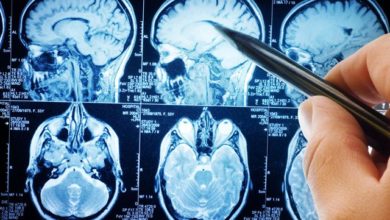Increase in the vertical size of the pituitary gland
The content of the article
Causes of tumor formations
There is still no clear answer to what causes the enlargement of the part of the brain in question. Theoretically, the cause of the tumor could be:
- predisposition to tumor;
- infections caused by viruses;
- chronic inflammation of the frontal and temporal lobes;
- closed and open traumatic brain injury;
- hormonal imbalance due to taking a synthetic hormone.
Signs of a tumor
As a non-hormone-producing tumor enlarges, there is pressure on the lobes of the brain, which leads to the following symptoms:
- Visual disturbances due to swelling of the optic nerve, which can lead to blindness.
- Involuntary eye twitching, and in some cases complete paralysis.
- Headache.
- Heart failure.
- Increased blood pressure, often accompanied by bleeding in the pituitary gland.
- Regular loss of consciousness due to the penetration of an enlarging tumor into the hypothalamus.
If the malignant tumor still produces one or another hormone, then the hormonal imbalance will make itself felt even before the tumor begins to put pressure on the brain.
ACTH volume is accompanied by the following symptoms:
- impaired functioning of the reproductive system;
- fat deposits in the thighs and face;
- atrophy of the muscles of the arms and legs;
- pale and dry skin;
- facial hair grows in women;
- impotence;
- weakening and brittleness of bones;
- high blood pressure;
- accelerated heartbeat;
- depression followed by euphoria;
- inhibited reaction.
Adenomas contribute to a further increase in thyrotropin, causing functional malfunctions of the thyroid gland. As a result:
- constipation appears;
- weight increases;
- inhibition is observed;
- hair falls out and skin becomes dry;
- cardiovascular failure develops;
- metabolic disorders are observed.
Diagnostics
Diagnostics are carried out by a number of specialists. For example, an ophthalmologist assesses the quality of vision and examines the fundus of the eye. The endocrinologist, based on blood tests, assesses how significant the hormonal imbalance is - determines the missing hormones and those that are in excess in the body. A neurologist studies the brain using radiography and various types of tomography (computer and magnetic resonance imaging). If necessary, angiography is performed to analyze the functioning of the brain vessels.
Treatment
As a rule, patients with the disease in question are treated surgically, without affecting the medulla, since the pituitary gland is penetrated through the sphenoid bone. The operation is carried out under the supervision of a neurosurgeon, after which the patient is sent to an endocrinologist for long-term therapy with hormonal drugs.
Radiation therapy is carried out in case of inoperable tumor formations. cryodestruction is used to freeze and destroy the tumor, in which a small puncture is made in the bone and a thin instrument is inserted into the pituitary gland.
Prevention of pituitary tumors
To avoid illness, you need to follow safety precautions - wear a hard hat or helmet at work and other places where it is recommended.
Also, you should not take hormonal medications without consulting your doctor.
It is recommended to undergo a full examination in the hospital, which will allow the tumor to be diagnosed at an early stage.
Please rate the article:





